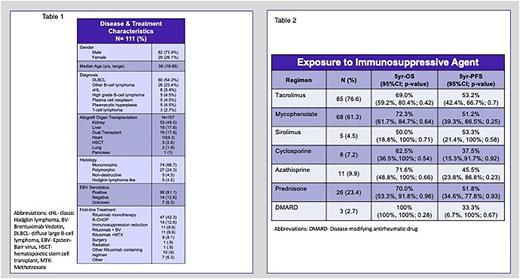Abstract
Background: Posttransplant lymphoproliferative disorder (PTLD) is a spectrum of lymphoid diseases associated with the use of potent immunosuppressive drugs following solid organ or hematopoietic stem cell transplantation. The most widely accepted mechanism of PTLD pathogenesis is diminished cytotoxic T-lymphocyte and natural killer cell function, resulting from post-transplant immunosuppressive therapy, allowing for unregulated proliferation of lymphocytes infected with Epstein-Barr virus (EBV). However, approximately 1/3 of the cases of PTLD occur in EBV-negative individuals, suggesting additional immunopathologic mechanisms of disease pathogenesis. Immunosuppressive therapy with the calcineurin inhibitor tacrolimus and antimetabolite azathioprine have both demonstrated higher risk for developing PTLD than other immunosuppressive regimens. However, limited information exists regarding the relationship between immunosuppressive agents and outcomes in PTLD. Here we report the results of a single-center, retrospective analysis with the primary objective to examine whether post-transplant immunosuppressive agents impact outcomes in PTLD.
Methods: Patients (pts) with a diagnosis of PTLD were identified by Electronic Medical Records database query. Inclusion criteria were age ≥ 18 years at the time of diagnosis, confirmation of PTLD by internal pathology review, primary diagnosis from 2008-2018, and receipt of therapy and surveillance care at Northwestern University in Chicago, Illinois, USA. Exploratory univariate analyses were performed using Kaplan-Meier estimates with 95% confidence intervals and log-rank p-values for time-to-event outcomes; significance was set at p < 0.05. Response to treatment and disease progression were classified per provider-specific interpretations of clinical data as assessed by patient chart review.
Results: A total of 182 pts with a diagnosis of PTLD were identified by database query and 111 pts met inclusion criteria. Of the 111 pts included in this analysis; 82 pts (73.9%) were male with a median age at diagnosis of 56yrs (range 19-85) [Table 1]. The median time from transplant to diagnosis of PTLD was 78.9 months (range 2-324). Eighty-four pts (75.7%) received immunosuppression with a multi-drug regimen, with the most common combination of medications being mycophenolate mofetil and tacrolimus (n=54, 48.6%). Overall, 85 pts (76.6%) were treated with a tacrolimus containing regimen, 68 pts with mycophenolate, 26 pts with prednisone, 11 pts with azathioprine, 8 pts with cyclosporine, 5 pts with sirolimus, and 3 pts with a disease-modifying antirheumatic drug (DMARD) [Table 2]. Immunosuppression was decreased in 100 out of the 111 pts prior to starting treatment for PTLD and 11 pts were treated with immunosuppression reduction alone [Table 1]. Eighteen pts (16.2%) experienced graft rejection, of which 27.8% required re-transplantation. For all pts, the five-year OS and PFS were 70.7% and 49.7%, respectively. When stratified by exposure to different immunosuppressive agents, there was no difference in outcomes across all groups [Table 2].
Conclusions: Here we report one of the largest retrospective cohorts of pts with PTLD reported in the literature. Our analysis suggests that choice of immunosuppressive agent in the post-transplant setting does not impact outcomes in PTLD.
Disclosures
Friedewald:Eurofins - Transplant Genomics: Consultancy; Eurofins - Viracor: Research Funding; Veloxis: Research Funding; Hansa BioPharma: Research Funding; CSL Behring: Research Funding; Regeneron: Research Funding. Winter:Daiichi Sankyo: Other: for Spouse, to the University of Chicago, Research Funding; Novartis: Consultancy, Other: for Spouse, to the University of Chicago, Research Funding; Rafael: Other: For Spouse, to University of Chicago, Research Funding; Forty Seven/Gilead: Other: For Spouse, to University of Chicago, Research Funding; Astellas: Other: For Spouse, to University of Chicago, Research Funding; CVS/Caremark: Consultancy, Other: For Spouse; Servier: Consultancy, Other: For Spouse; Cellectis: Other: for Spouse, to the University of Chicago, Research Funding; Merck & Co., Inc.: Honoraria, Research Funding. Gordon:Ono Pharmaceuticals: Consultancy; Janssen: Other: DSMB; BMS: Research Funding; Zylem: Current equity holder in private company, Current equity holder in publicly-traded company, Patents & Royalties: Patent on nanoparticles for lymphoma therapy. Karmali:Eusa: Consultancy; Kite: Consultancy, Other: Advisory Board, Research Funding, Speakers Bureau; Karyopharm: Consultancy; Takeda: Research Funding; BMS/Celgene: Consultancy, Research Funding; Pharmacyclics: Consultancy, Other: Advisory Board; Genentech/Roche: Consultancy, Other: Advisory Board; Calithera: Consultancy, Membership on an entity's Board of Directors or advisory committees, Other: Advisory Board; Morphosys/Incyte: Consultancy, Other: Advisory Board, Speakers Bureau; AstraZeneca: Other: Advisory Board, Speakers Bureau; BeiGene: Consultancy, Other: Advisory Board, Research Funding, Speakers Bureau. Ma:Abbvie: Consultancy, Research Funding; AstraZeneca: Consultancy, Research Funding, Speakers Bureau; BeiGene: Consultancy, Research Funding, Speakers Bureau; Bristol Myers Squibb: Consultancy; Janssen: Consultancy, Research Funding, Speakers Bureau; Pharmacyclics: Consultancy, Research Funding, Speakers Bureau; TG Therapeutics: Consultancy, Research Funding; Juno: Research Funding; Loxo: Research Funding. Pro:Seattle Genetics: Honoraria. Moreira:Ingenio Rx: Consultancy; CTI BioPharma: Consultancy.
Author notes
Asterisk with author names denotes non-ASH members.


This feature is available to Subscribers Only
Sign In or Create an Account Close Modal